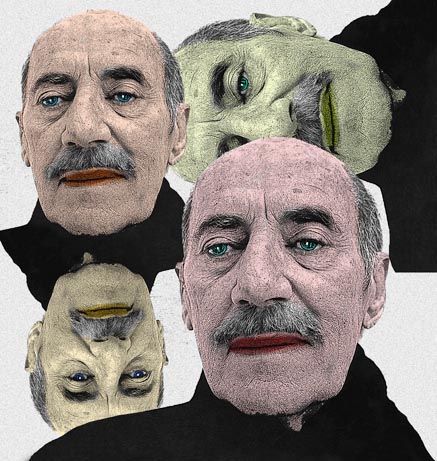Groucho
Marx Biography
Born Julius Henry Marx
( 1890 – 1977 )
Comedian,
actor, singer, and writer. Born Julius Henry Marx on October 2,
1890, in New York City. Groucho Marx spent nearly seven decades
making people laugh with his snappy one-liners and sharp wit. He
once described his comedy as "the type of humor that made people
laugh at themselves."
While
he originally aspired to be a doctor, Marx started his career as
a singer. One of his earliest efforts proved to be disastrous, however.
As part of the Le May Trio, Marx got stuck in Colorado for a while
after another group member took off with his pay. He had to work
at a grocery store to earn enough money to make it back to New York.
Marx's
father Samuel never had much success as a tailor, and the family
struggled financially. His mother Minnie hoped that she might find
prosperity through her five children. She became the quintessential
"stage mother," guiding her children's theatrical acts
and even performing herself. The act eventually featured Groucho
and his brothers Leonard, Adolph, and Milton. Groucho received his
colorful nickname from fellow vaudeville performer Art Fisher because
of his personality. Fisher also coined amusing names for Marx's
brothers, renaming Leonard "Chico," Adolph "Harpo,"
and Milton "Gummo." Milton left the act to fight in World
War I and was replaced by youngest brother Herbert, known as "Zeppo."
Both Herbert and Milton later became theatrical agents.
The
Marx Brothers had a career breakthrough in 1914 while performing
in Texas. During a show, some of the audience left to go see a runaway
mule. When they returned, the Marx Brothers put aside their usual
routines to make fun of the audience. Groucho's quick-witted quips
won over the crowd. The switch to comedy proved to be their ticket
to success.
By
the 1920s, the Marx Brothers had become a hugely popular theatrical
act. Groucho had developed some of his trademarks by this time.
He often wore a long coat, a painted-on mustache, and thick glasses,
and held on to a cigar on stage. In addition to just liking cigars,
Marx explained that they proved useful, too. He said that "if
you forget a line, all you have to do is stick the cigar in your
mouth and puff on it until you think of what you've forgotten."
The
Marx Brothers had a string of Broadway hits, starting with 1924's
I'll Say She Is, which Groucho helped write. The following year,
they returned to the stage with The Cocoanuts, a spoof on land speculation
in Florida. The Marx Brothers hit it big again in 1928 with Animal
Crackers.
In
great demand, Marx appeared on Broadway in Animal Crackers at night
while filming the film version of The Cocoanuts during the day.
Around this time, he nearly suffered a complete mental breakdown.
His hectic schedule and his enormous financial loss in the 1929
stock market crash had taken a toll on the performer and left him
with a lifelong problem with insomnia.
Working
with producer Irving Thalberg, the Marx Brothers created one of
their most popular movies A Night at the Opera (1935). As the decade
drew to a close, the Marx Brothers continued to make more films,
but none matched the success of their earlier efforts. Their last
film together was 1949's Love Happy.
Even
before the Marx Brothers split up, Groucho had been exploring other
career opportunities. He wrote the 1930 humorous book Beds and followed
it up in 1942 with Many Happy Returns, his comic attack on taxes.
On the radio, Groucho worked on several programs before landing
a hit in 1947 with You Bet Your Life. He hosted the quirky game
show, which focused more on his quick wit than on contestants winning
prizes.
You
Bet Your Life moved from radio to television in 1950, and Marx entertained
America with his wisecracks for eleven years. After that program
ended in 1961, he appeared on Tell It to Groucho, a short-lived
game show the following year. Then Marx largely retreated from the
limelight for several years, making only sporadic appearances on
television and in films.
Instead
of performing, Marx wrote a follow-up to his 1959 autobiography
Groucho and Me. This time around, he focused on love and sex in
1963's Memoirs of a Mangy Lover. The thrice-married comedian had
a lot to say on those topics. Marx had been married to first wife
Ruth from 1920 to 1942. The couple had two children together, Miriam
and Arthur. He had his third child, Melinda, with his second wife,
Catherine Gorcey. His third marriage to Eden Hartford lasted from
1953 to 1969.
A
prolific correspondent with friends and associates, Marx had his
personal writings published in 1967 as The Groucho Letters. He returned
to the stage in 1972. with a one-man show at New York City's Carnegie
Hall. Crowds turned out to see this performer, now in his eighties.
He had trouble hearing and his voice much weaker than it was in
his prime. Still he managed to charm and entertain the audience.
Two years later, Marx received a special Academy Award.
By
1977, Marx was in decline both physically and mentally. He struggled
with health problems, and his family battled with his companion
Erin Fleming over control of his affairs. After spending nearly
two months in a Los Angeles hospital, Marx died of pneumonia on
August 19, 1977. "He developed the insult into an art form,"
as Marx was remembered in The New York Times. "And he used
the insult, delivered with maniacal glee, to shatter the egos of
the pompous—and to plunge his audience into helpless laughter."
©
2010 A&E Television Networks. All rights reserved.

